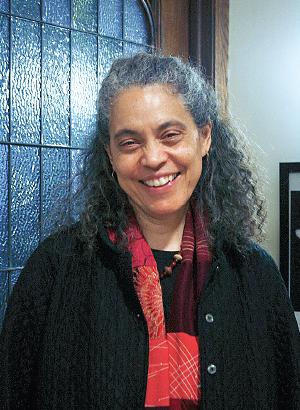Psychiatrist Exposes How Public Policies Have Devastated Health of Communities
Abstract
While meant to be restorative, many urban-renewal policies create harmful mental health conditions for community residents. One psychiatrist is tackling these issues and encourages her colleagues to do the same.
Terms such as “planned shrinkage,” “serial displacement,” and “Hope VI” are nowhere to be found in the lexicon of the average psychiatrist, but then again, Mindy Fullilove, M.D., is no average psychiatrist. She has dedicated her career to studying the harmful effects of urban-renewal policies on residents of communities and cities.

By challenging destructive public policies that create dangerous living conditions for those living in poor neighborhoods, psychiatrist Mindy Fullilove, M.D., aims to improve the mental health of these communities.
As an author, professor, and activist, she has carefully studied the epidemics of violence and of diseases such as HIV and addiction and traced them to policies that led to the fracturing of communities. Her seventh book on the subject, Urban Alchemy: Restoring Joy in America’s Sorted Out Cities, is set to be published in June and explores some of her work with residents living in the Hill District neighborhood of Pittsburgh. This neighborhood is currently recovering from a number of policies that separated residents from one another and from the rest of the city.
Fullilove is a professor of clinical psychiatry and public health at Columbia University.
At the beginning of her career, Fullilove worked as a community psychiatrist in the South Bronx and then in San Francisco during the beginning of the AIDS epidemic and then the crack cocaine epidemic, both of which she went on to research on a full-time basis. “In San Francisco, seeing these epidemics tear the city apart with such force was a stunning experience,” she told Psychiatric News.
It was around that time that Fullilove read an article that became seminal to her thinking—the author was Rodrick Wallace, Ph.D., and he linked an urban planning policy called “planned shrinkage” in the South Bronx to the spread of HIV and the creation of conditions that led to a massive increase in violence and drug addiction in that area.
Planned shrinkage, first employed in New York City in 1976, is the deliberate withdrawal of city services such as police patrols, garbage removal, and street repairs, for instance, from lower-income neighborhoods. While it has been justified by some as a way to preserve city services in times of fiscal shortages, it has been criticized by others as a way to destroy poor neighborhoods by driving residents elsewhere.
Wallace wrote that as the South Bronx population dispersed due to the stoppage of services, close social networks were shredded, and HIV-control strategies were disrupted.
“It became apparent to me that the policies that influenced community health originate in higher structures like the city, state, and federal government, which are distributing resources to these communities. The real question is how you influence these policies,” Fullilove remarked.
In the next stage of Fullilove’s career, another city would serve as a learning experience for her and would, in turn, benefit from her activism. A fellowship funded by the Maurice Falk Medical Fund brought Fullilove to the University of Pittsburgh Graduate School of Public Health’s Center for Minority Health in the late 1990s. While spending time in the city then and in the years to follow, she was invited to speak to residents of the Hill District neighborhood of Pittsburgh, which is nestled against the city’s downtown and lies between the Allegheny and Monongahela rivers.
She learned that Hill District residents were distressed about the city’s plans to implement a federal program called Hope VI that would demolish 25 percent of public housing for nearly 1,000 Hill District residents and replace it with dwellings meant for “mixed income” families. The Hope VI program had first driven thousands of Hill District residents from their homes in the 1960s.
The Hill District, known as “Little Harlem” in the 1930s and 1940s, was once a vibrant community known for its jazz clubs. Musicians such as Art Blakey, John Coltrane, and Dizzy Gillespie once headlined at the Crawford Grill on Centre Avenue. By the early 1950s, however, the Hill was falling under the shadow of the newly erected Civic Arena, and the city decided to demolish large portions of the neighborhood. More than 8,000 residents and 400 businesses were eventually displaced. “If you destabilize neighborhoods continuously,” Fullilove noted, “they can’t repair themselves.”
Over the years Fullilove has spent a great deal of time with Hill District residents, talking with them about the toll that serial displacement has taken on their communities and families, and she has attended city planning meetings with them. The Civic Arena was torn down in 2012, and today, due in part to their involvement in planning meetings, Fullilove sees a different kind of hope in the futures of remaining Hill District residents.
Annelle Primm, M.D., M.P.H., called Fullilove’s work “truly groundbreaking” and noted that “through her meticulous and comprehensive study of the history of the African-American community in the Hill District of Pittsburgh, she has synthesized a narrative that reveals the succession of multiple destructive policies at the root of its decline and that of many other urban communities around the country.” Primm is deputy medical director and director of the Office of Minority and National Affairs at APA.
Primm described these policies as social determinants of health that go hand in hand with poverty, segregated housing, job discrimination, and other negative forces that exact a heavy toll on community mental health and social well-being.
“As psychiatrists, we need to be concerned with treating the adverse effects of these forces on mental health and working with community residents to foster resilience. Simultaneously, psychiatrists have a role to play in collaborating with community leaders to focus on ‘upstream’ issues and advocate for social policies that generate a strong social fabric, healthy environments, and thriving communities.” ■



